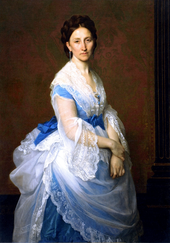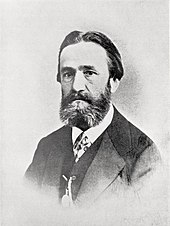Paul von Derwies
Paul Grigorjewitsch of Derwies ( Russian Павел Григорьевич фон Дервиз * January 30 jul. / 11. February 1826 greg. In Lebedyan , † June 2 jul. / 14. June 1881 greg. In Bonn ) was a Russian railroad entrepreneur and patron .
Life
Von Derwies came from an old Hamburg family, whose best-known representative was the Hamburg mayor Hinrich Diederich Wiese (1676–1728). His great-nephew Johann-Adolf Wiese († 1762) was a lawyer , served in Sweden and then entered the service of Duke Karl Peter Ulrich of Schleswig-Holstein-Gottorf , who was named Peter III. 1762 became Emperor of Russia . Johann-Adolf Wiese went to St. Petersburg with the Duke in 1740 and entered Russian services. For loyal service, the duke raised him to the German nobility, so that he was now called Johann-Adolf von der Wiese.
Paul von Derwies was the son of the Russian State Council (fifth rank ) and later director of the orphan institute Gatchina Grigori Ivanovich Derwies (1797-1855) and his wife Barbara Nikolajewna Makejew (1798-1848). He attended the English Hirst boarding school in St. Petersburg and then studied there at the Imperial Law School . To improve his living situation, he gave piano lessons . In 1847 he graduated with a gold medal.
After completing his studies, Von Derwies joined the Senate in the heraldry . In 1850 he became a college assessor (eighth grade class). During the Crimean War he served in the military office in the provisions department . In 1857 he left the civil service as a councilor to become an entrepreneur.
Von Derwies published enthusiastic articles about the development of the railroad in Russia in the St. Petersburg Stock Exchange and the Moskowskije Vedomosti . In 1859 he became General Secretary of the President of the Moscow - Saratov Railway Company, founded in 1856 . In 1863 he became chairman of the board of the Moscow Ryazan Railway Company (until 1868). In 1865 he was CEO of Rjasan- Koslow -Eisenbahngesellschaft (up to 1868). Thanks to his good relations with government agencies, he quickly obtained the concession to build and operate it, so that the work could be completed by 1868. In 1866 he became chairman of the board of the Kursk - Kiev railway company (until 1867). Karl von Meck was his chief engineer in all of his railway undertakings.

Von Derwies amassed a considerable fortune within 10 years. He bought the large estate Staroschilowo and other properties in St. Petersburg, in Switzerland and in France . He had entrusted the management of his operations to his brother Ivan Grigoryevich von Derwies. He devoted himself to music , travel and euergetism . In 1868 he settled in Nice and built the neo-Gothic Château Valrose with a concert hall on an estate acquired in 1867 . He regularly organized demanding concerts there , at which Joseph Joachim , Francis Planté , Adelina Patti and César Thomson performed in particular . The conductors included Karel Bendl , Hans Winderstein , Joseph Hasselmans and Karl Müller-Berghaus . Composed of Derwies instrumental music , the opera La Comtesse de Lascaris and songs on poems by Pushkin and Lermontov , with his family, the family was used by Derwies.
In 1871 von Dewies in Trevano had the Villa Castello di Trevano built by the architect Robert Gödicke and Botta on a hill on which there used to be a medieval castle . The house church of the Nativity was built by David Grimm , who also designed the house church in Valrose (the iconostasis there is now in the Chapelle Orthodox Russian Saint-Nicolas in the Russian cemetery in Nice).
In addition, von Derwies spent a lot of money on charity and had an asylum home built near Valrose, which is now the École maternelle et École primaire Von Derwies . After the early death of his children Vladimir (1854–1855) and Andrei (1868–1869), he wrote to the mayor and the military governor of Moscow asking for support for the construction of a children's hospital, which in fact was modeled on the The children's hospital opened by Prince Peter von Oldenburg in St. Petersburg in 1867 was built and opened in 1876 and given the name of St. Vladimir . Von Derwies was a member of the Imperial Russian Music Society and the Society of Friends of Natural Science , Anthropology and Ethnography, as well as the board of directors of the Ryazan boys' high school. He accepted the presidency for the St. Petersburg Ochta Institute for Mechanics and Technology .

Von Derwies was married to Wera Nikolajewna nee Tietz (1832–1903), daughter of the German-born director of the Gatchina Orphanage Institute, and had five children: Vladimir (1854–1855), Sergei (1863–1943), Varvara (1864–1881, bone tuberculosis ) , Andrei (1868-1869) and Paul (1870-1943). From 1874 Vera Nikolaevna lived with the children separated from her husband.
Derwies, his father Grigori, his wife, his daughter Varvara and his son Vladimir were buried in the family crypt in the church of Moscow's Vladimir Children's Hospital (today there is a hot water heater on it).
Web links
Individual evidence
- ↑ Антонов В. В .: Род Дервизов в Петербурге и в России . In: Фонтанка: культурно / исторический альманах . No. 4 , 2009, p. 31–45 ( mirpeterburga.ru [PDF; accessed September 5, 2017]). Род Дервизов в Петербурге и в России ( Memento of the original from April 3, 2012 in the Internet Archive ) Info: The archive link was inserted automatically and has not yet been checked. Please check the original and archive link according to the instructions and then remove this notice.
- ↑ a b c КОРОЛЬКОВ Александр Григорьевич: СТАРОЖИЛОВСКИЙ КОННЫЙ ЗАВОД (accessed September 5, 2017).
- ↑ Некролог . In: Санкт-Петербургские ведомости . No. 122 , 1881.
- ↑ a b c d e f Русский биографический словарь . St. Petersburg, Moscow 1918.
- ↑ Paul von Derwies (Italian) on ricercamusica.ch/dizionario/ (accessed on: November 13, 2017.)
- ↑ Кирицы (accessed September 5, 2017).
| personal data | |
|---|---|
| SURNAME | Derwies, Paul von |
| ALTERNATIVE NAMES | Derwies, Paul Grigoryevich von (full name); Дервиз, Павел Григорьевич фон (Russian) |
| BRIEF DESCRIPTION | Russian railroad entrepreneur and patron |
| DATE OF BIRTH | February 11, 1826 |
| PLACE OF BIRTH | Lebedjan |
| DATE OF DEATH | June 14, 1881 |
| Place of death | Bonn |

